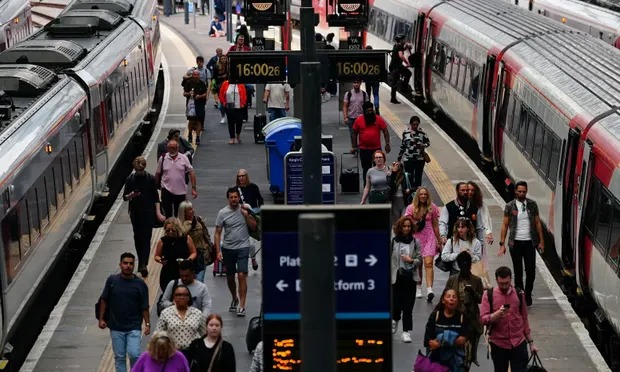Passengers in England will not face a crippling double-digit rise in rail fares of as much as 12% after the government said it would step in to keep prices lower amid the soaring cost of living crisis.
Fares traditionally increase each January, based on the retail prices index (RPI) recorded the previous July plus 1%.
That figure – forecast to be as high as 11.9% after inflation rose to the highest rate in 40 years – is due to be announced on Wednesday.
If fares were raised by this much, the cost of an annual season ticket from Reading to London would rise by £600 to £5,644, and £684 to £6,440 commuting between the capital and Colchester.
The rise would be almost double the previous record increase and the biggest increase for regulated fares since privatisation in 1993. The previous peak was 5.9% in 2009.
However, the government has pledged that the rise will be below the rate of inflation and the increase will be delayed being implemented until March. During the coronavirus pandemic the annual increase in rail fares was pushed back from January to March.
“The government is taking decisive action to reduce the impact inflation will have on rail fares during the cost of living crisis and will not be increasing fares as much as the July RPI figure,” a spokesperson for the Department for Transport said.
She said: “We are also again delaying the increase to March 2023, temporarily freezing fares for passengers to travel at a lower price for the entirety of January and February as we continue to take steps to help struggling households.”
The pledge relates to regulated fares in England, which cover about 45% of journeys including season tickets, some off-peak return tickets on long-distance journeys and anytime tickets around major cities.
In March, in England and Wales, which usually matches the rise made in England, there was the steepest increase in regulated train fares since January 2013, with a rise of 3.8%.
Fares for rail services in Northern Ireland are set by the state-owned operator Translink, which does not use RPI.
The Scottish government has not announced its plan for next year yet.
Rail workers across the country continue to hold strikes over pay. On Saturday about 6,500 train drivers who are members of the Aslef union took action. More strikes are planned for the coming week, with members of the RMT and TSSA unions walking out on 18 and 20 August.
Industrial action will also be taken on 19 August by London Underground and London bus drivers.
Source: The Guardian


